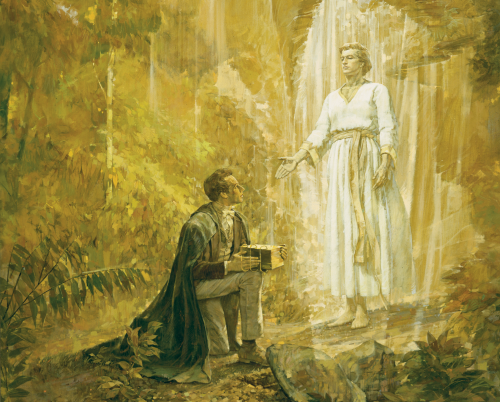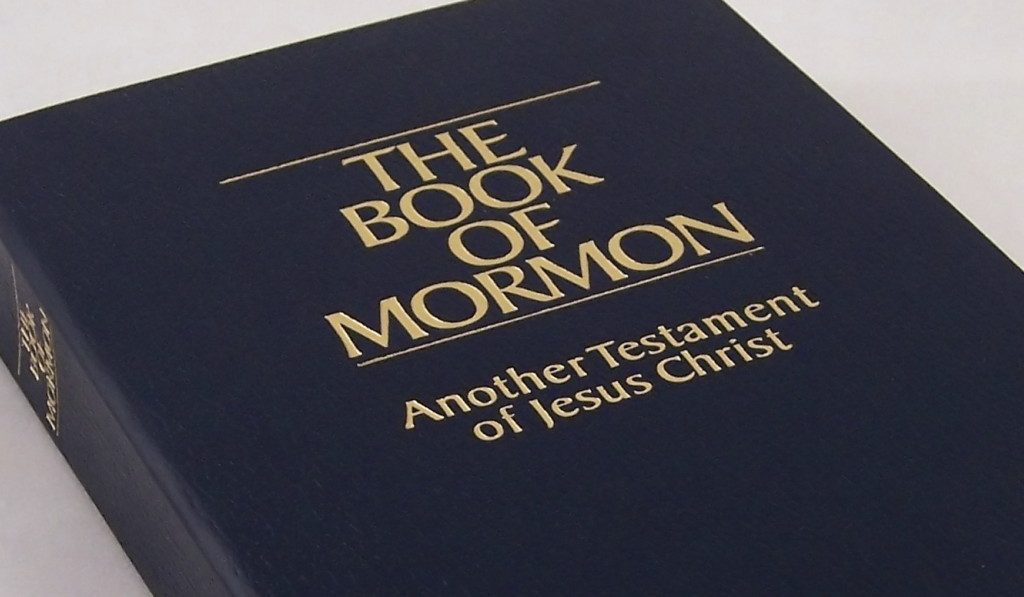You’re walking down a busy street. A sharply dressed man or woman approaches you. Their smile is friendly and inviting, but they’re eager to have a moment of your time. Their nametag reads: ELDER YOUNG – The CHURCH OF THE LATTER-DAY SAINTS. You’ve come across a Mormon. What are you supposed to say to them? How do you respond to their questions? In this article, I intend to provide a brief overview of who Mormons are and what they believe so that you may not be swayed by their false doctrine but share the truth with them.
How Mormonism began
The early 19th century was a period of heightened religious fervour amidst the Second Great Awakening. For a young man in 1820 named Joseph Smith, this was a time of great confusion and strife among denominations. Therefore, he sought divine counsel from James 1:5 – he asked for the necessary wisdom which God generously gives to all who ask. In doing so, he allegedly had a vision from heaven. God the Father and His Son Jesus Christ stood above him. He asked which one of the denominations were correct and which one he should join. However, he was informed that all denominations were evil and corrupt as they had fallen into apostasy. In 1823, Smith was persuaded that God had called Him to be a prophet which was confirmed to him by an angelic visitation. This positions us to discuss some of the Latter Day Saints’ (LDS) beliefs.

1. The Bible and the Book of Mormon
Mormons believe that the Bible is the word of God, but only ‘as far as it is translated correctly.’[1] They also regard other texts to be scripture: The Doctrine and Covenants, The Pearl of Great Price and most famously, the Book of Mormon. Accordingly, they state that the Bible and the Book of Mormon complement one another with the latter confirming the teachings of the former. [2] At his supposed angelic visitation in 1823, Smith was instructed to find a book written upon golden plates, which he translated by using two reading crystals ‘urium and thummim’ to then publish The Book of Mormon. Smith is said to have done so with the authority of a prophet.
Just like God spoke to Moses and Noah in the Bible, He also spoke to people in the Americas. These men wrote down God’s word. Their writings were eventually gathered into one book, the Book of Mormon: Another Testament of Jesus Christ.
The Church of the Latter-day Saints: How the Bible and the Book of Mormon Work Together

LDS doctrine undermines the sufficiency and inerrancy of Scripture. The suggestion
is that we do not have a closed canon, but need additional texts to make the Bible complete, correct its errors and make up for its deficiencies. In short, the Bible is not enough. This is at odds with what the Bible claims for itself. Psalm 19:7-14 and Psalm 119 are the signature texts on the sufficiency of Scripture. Psalm 119 uses eight different terms to refer to the law of God: ‘word’, ‘judgements’, ‘statutes’, ‘decree’, ‘law’, ‘commands’, ‘precepts’, ‘ways’ and ‘promises’. Dever suggests that such a vastness of terms evidences a broader understanding which extends beyond the Torah alone and to other portions of the Old Testament the psalmist had access to at the time. [3] God’s Word, which is found in the biblical text:
- Transforms the soul – is sufficient for salvation (Psalm 19:7a; James 1:18; 1 Peter 1:23).
- Is trustworthy and sufficient to take the naïve and uninformed person and give them ‘Hokmah’ (Greek) – skilful living and the ability to navigate life in a God-honouring way (Psalm 19:7b).
- Right – absolute truth which is sufficient to live obediently, leading us to the path of joy (Psalm 19:8a; Luke 11:28).
- Pure – it is exact and singular in its meaning. It gives enlightenment as opposed to confusion. Thus, it is completely righteous and true (Psalm 19:8b).
Moreover, God has spoken to us through His written Word communicated to us through
human authors who wrote under the inspiration of the Holy Spirit (2 Tim. 3:16). Thus,
the Bible is without and is incapable of error (Num. 23:19; Prov. 30:5; Titus 1:12; Hebrews 6:18). This renders the claim of the Bible only being the word of God if ‘translated properly’
nonsense.
2. The doctrine of God
According to their understanding, unlike the Holy Spirit, God [the Father] has a physical body as the Son does. [5] Moreover, they deny the doctrine of the notion of a triune God. Instead, The Father, the Son and the Holy Spirit are three distinct Gods, but not one.
In contrast, the Bible teaches that God is one in His being (nature) (Deu. 6:4; 1 Cor. 8:4). He also exists in three distinct persons – Father (John 6:27; Rom.1:7; 1 Pet. 1:2), Son (John 20:28; Titus 2:13; 2 Peter 1:1) and Holy Spirit (Acts 5:3-4; 1 Cor. 3:16). Each distinct person has different roles. For example, the Father initiates the plan for salvation (Eph. 1:3-5). The Son accomplishes this plan through His willing obedience (John 3:16; 6:38; Gal. 4:4; Eph. 1:9– 10; Heb. 10:5-7). We are then regenerated – receive new spiritual life – by the Spirit (John 3:5-8) who applies and seals this redemptive work (2 Cor 1:22; Eph. 1:13) and sanctifies us (Rom. 15:16; 1 Pet. 1:2). This is one great work performed by the One being of God in which each Person plays their respective roles.
3. Salvation
Concerning salvation, Mormons believe that by placing your faith in Jesus’ atonement, repentance, baptism and receiving the gift of the Holy Spirit, you will be saved (using Acts 2:37-38 as the basis). However, a person’s salvation is conditional upon their continuance in faithfulness and obedience to the First Principles and Ordinances which contains the Ten Commandments among other things. Their official website reads:
Individuals cannot be saved in their sins; they cannot receive unconditional salvation simply by declaring a belief in Christ with the understanding that they will inevitably commit sins throughout the rest of their lives (see Alma 11:36–37). However, through the grace of God, all can be saved from their sins (see 2 Nephi 25:23; Helaman 5:10–11) as they repent and follow Jesus Christ. [6]
– The Church of the Latter Day Saints

In summary, the LDS teach a salvation of grace and works. Contrastingly, the Bible states that it is by the grace of God alone that we are saved (Ephesians 2:8-9). You must repent and believe in Jesus and place your faith in His life death and resurrection to be forgiven, receive eternal life, and save you from eternal punishment. We work as a result of the salvation we have received freely by faith, not to attain it.
The content of this article is not intended to be exhaustive, but to provide an overview of LDS beliefs. By familiarizing yourself with some basics, you have a foundation for further research and material for conversations with Mormons. Pray hard, study hard and share truth with kindness.
- Article 8 of Faith – The Church of the Latter-day Saint
- How the Bible and the Book of Mormon Work Together
- John F. Macarthur The Inerrant Word: Biblical, Historical, Theological, and Pastoral Perspectives (Crossway Books, 2016 Crossway Books) 63
- Doctrine and Covenants 84
- Doctrine and Covenants 130:22
- The Church of the Latter Day Saints Salvation